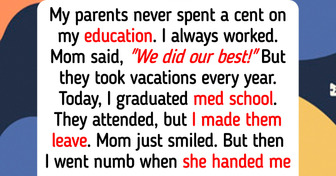I think you were right on!!!
I Snatched My Tip Back Because of the Waiter’s Nasty Attitude
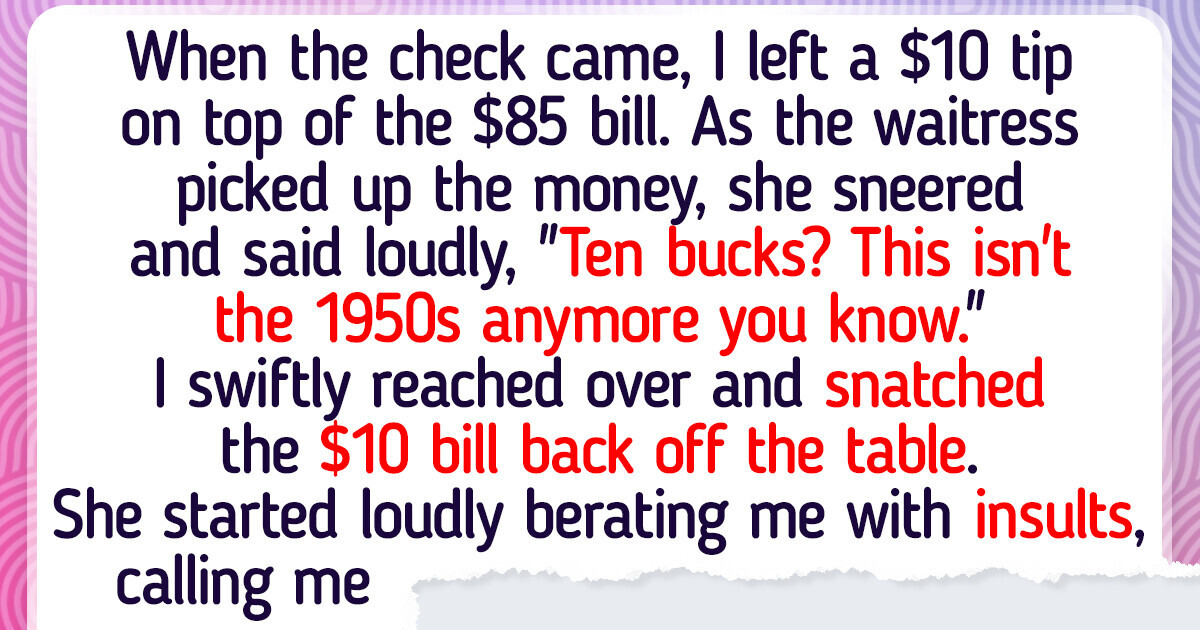
We've all been there - a nice evening out to mark a special occasion, only to have it marred by an unpleasant encounter. Amelia's letter detailing her recent restaurant experience raises important questions about tipping etiquette, customer service, and how to navigate conflict.

$10 is slightly more than a 10% tip...usually, 10%-15% is decent if the service was good...if the wait staff were very attentive and service was good, with the wait staff spending 1 1/2 to 2 hours on serving your table, then a 20% tip is more called for...waitress was wrong and had a bad attitude...
Diners shouldn't be held responsible to pay the restaurants employees. They should get at least minimum wage
No, you shouldn't have brushed it off. The waitress should have appreciated what she got. She should get another job if not happy with her wages.
No diners shouldnt be responsible to pay the restaurant's employees... however $10 on an $85 bill is not enough. I do not agree with how the waitress handled it she should have kept her mouth shut and bitched about it to the other wait staff in the back, but she wasnt wrong in feeling how she felt. This is coming from a former waitress and its usually the ones that run your ass off that leave crappy tips like that. Never approach the customer but yea it was a shitty tip. Sorry but not sorry.
4806043652
Every place seems to think tips are "owed". There's a space to give tips even when you are just picking up your food. I believe tips are decided by the customer. Contrary to what is believed, tips are taxable and reported by employers (even cash ones are estimated and reported). Sorry you have decided to be in a low paying occupation. That's your choice. The tip is my choice.
Wait staff only make about $2.85 an hour and rely largely on their tips because the pay is so low. They do not fall under "minimum wage." Once I learned that, I realized that anything less than `15% - 20% is pretty insulting to someone working hard to make a decent living. I don't go out if I cannot afford the price of my meal and a reasonable tip.
If theyvdont like the pay get another job why should we not get to enjoy a night out when we can cause some one thinks they are entitled to a big tip I base my tip on the service I get but honestly they they want batter pay they should all get together and demand minimum wage and if they don't and if they don't get it well look for a better job
sorry but don't agree...people work at jobs because THEY HAVE TO.. they have to support themselves, and if being wait staff is all that's available in an area, then theirr choices are limited...the govt. sets the minimum pay rate, and wait staff are paid less as they will, they expect, to make money on tips...if you can afford to eat out you should factor a decent (more than 10%) tip into the cost...and on a $100 bill for two people, 20% -- you're probably having expensive food, wine and cocktails which means repeated visits to the table by the wait staff to deliver/remove food, plates, glasses etc, don't have an expensive meal and stiff the wait staff who served you
It's 2024 not 1954
Nobody at least in the state. I live in is making $2.85 an hour at a restaurant.
More like $18.25.
Thank you yes, they may not make as much as possible if they worked in high end restraunts or and non tip based job, but there are many of us barely makeing out by so we tip what we can based on the services we have received., it's like this your not going to pay the guardner that ran over your tulips, or high tip a waittrress with a bad attitude that made multiple mistakes there are just facts as someone barely making it by on a job that deals with patients and stress daily and most of the stress comes from those my patients
I love working with my parents most days... All jobs come with stress the question is can we do better, so we deserve better, and how do we want to be treated because that's what I live by, if I don't want to be treated like this then I will not treat anyone else poorly either.
You have a marvelous point....I myself usually leave between 15-20 % on the extremely rare occasion that we dine out.... that being said- it NEEDS TO BE EARNED. If I didn't see my waitress during my meal....and I need something and have to hunt her down- that is taken into consideration. If she is extremely busy and running her tail off- THAT is taken into consideration, there are other things I I factor also..... BUT IF I HAD RECEIVED SUCH A RUDE COMMENT-I WOULD HAVE either done EXACTLY what she did....or perhaps I would have left a dollar bill...
I will say that I more than likely would have left more than 10 dollars on that bill...but only if she deserved it. Her attitude suggests that she didn't.
I believe tips are decided by the customer, depending in how their service was. I once went out with my friends, we each put exactly what our food and drink costed, but we were having a 20 bucks extra out of the bill, we asked and they have put on the bill the 20 DLLs tip, we each put on 5 bucks more to complete the amount set on our bill.
Sadly, many places in the states have draconian laws for waitresses.
"cheapskate employers" are ALLOWED to pay what is a low minimum hourly wage that is set by the gov't as the expectation is that tip money will increase what the wait staff earns during a shift...the OP was right to take back the tip because of the nasty attitude by the waitress, not because it was punishing the employer for paying a basic minimum wage
If you had of been informed that tipping was now 20% may not have had this confrontation and she could have explained it without getting all snotty over it. Here in NZ they are paid a wage, tipping not necassary
I think you did the right thing!
You did right! Tipping it's out of control, they want a tip even when you buy an ice cream!
I leave what I can depending on service tell those ninjas to bring their prices down and maybe can tip more or how about nobody eat there at all and some point the place closes then nobody has a job and nobody got to eat and tip
Her attitude was awful, but honestly, your tip was pretty insulting (depending on the level of service before the incident of course). 15-20% has always been the norm. 11% is not a decent tip by any stretch. You were initially in the wrong, but she had no right to cause a scene. I would have probably snatched the tip back as well. Of course, I would most likely not be in this situation (again, depending on the service up to that point) because I would have left a standard tip from the get. Of course, I live in Las Vegas so I understand tipping culture. Probably more than I want to.
Tipping is not the norm, it is an option. The amount of the tip is dependent on the service. If they do not make enough money, the employer should pay them a liveable wage. We already pay for the food and the waitress gets paid to serve.
If I leave a tip it is 10% of bill. If they are not happy with that then tough.
I would have done pretty much the same, but left a penny tip.
The tip is, don't be greedy.
I would have done the same thing, I have waitressed in my past I would never act that way
No law saying you have to tip at all. Bad service, no tip, good service, fair tip, great service, great tip.
I use to be a waitress & I think it was a fair tip! You did the right thing!!!
Should have been $16 but she was definitely in the wrong.
Should have been whatever the customer decides. No percentage, no fixed amount, no inclusion on your bill no nothing but the customers decision.
When I was a waitress I was greatful for any tip that was left. I was always polite and attentive to my customers no matter their attitude. I didn't care what the normal was for tipping. You just never know whats going on with your customer. I will say that waitress was very rude and should have been greatful that you were even leaving any kind of tip. She isn't entitled to a tip. Its not mandatory. If it had been me I would have thanked you and would have said I hope to see y'all again and been genuine about and would have really wanted to see yall again.
Correct me if I’m wrong but 10 is 8.5% of 85 …
But the waitress shouldn’t be so entitled either.
10 es el 11.76% de 85
You do know that 10% of $85 is $8.50….easy little trick is if you take the decimal point and move it over to the left one place, you will always be able to figure out 10%
Who cares? Tips are to reward for good service. She doesn't deserve a tip.
You are wrong.
johnana, You are no doubt a waitress .....He is right. Does not have to tip at all....., His choice.
Incorrect
There’s a lesson in empathy and respect to learn.
Amelia, your letter regarding the unpleasant encounter with the waitress at the restaurant has raised several important points worth addressing. While the situation escalated in an unfortunate manner, it serves as a reminder that empathy and respect should be at the forefront of every interaction, whether between service providers or customers.
Maintaining composure and seeking to understand the perspectives of others can often diffuse tense situations and prevent them from spiraling out of control. Fostering a culture of mutual understanding and courtesy can go a long way in creating positive experiences for all parties involved, regardless of the context.
It’s only fair to expect the waitress to be professional and courteous.

AS A RESTAUANT OWNER FOR MANY YEARS AND I MIGHT ADD A TRAVELER TO MANY COUNTRIES..GOING TO RESTAURANTS IN MANY COUNTRIES.. YOU DID EXACTLY THE RIGHT THING.. SHE WAS A NASTY PERSON AND SHOULD NOT BE IN THE RESTRAUANT IDUSTRY.. GOOD FOR YOU...
You are right to expect a certain level of professionalism and courtesy from those in the service industry. Waitstaff are the face of the establishment and play a crucial role in creating a positive dining experience for patrons.
However, it is equally important to acknowledge the challenges and pressures they often face, which can sometimes lead to momentary lapses in judgment or patience. Long hours, demanding customers, and the stress of relying on tips for income can take a toll, though this does not excuse unprofessional behavior. Recognizing the unique challenges of the service industry can foster greater empathy and understanding, ultimately leading to more positive interactions between customers and staff.
Successful conflict resolution requires effective communication and emotional intelligence.
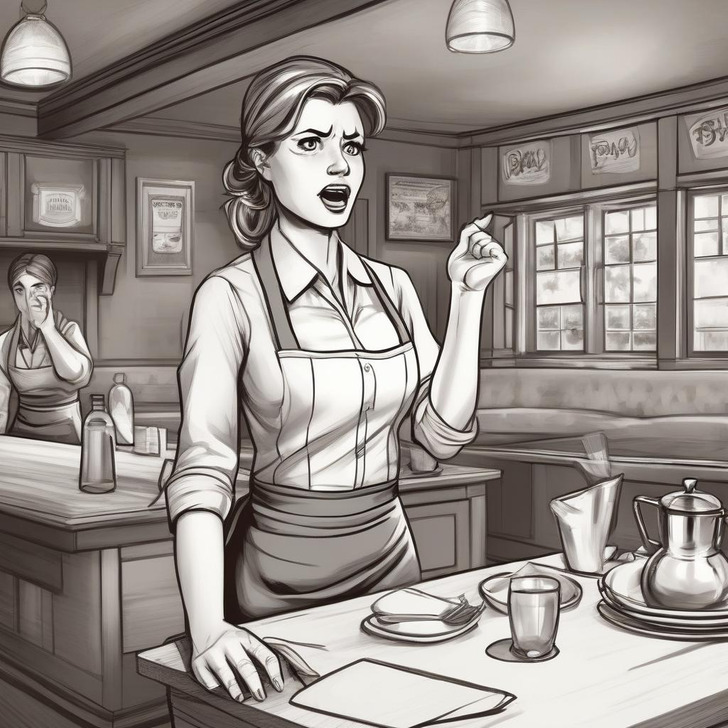
In an ideal scenario, the waitress should have addressed her concerns about the tip amount in a more tactful and respectful manner. Her condescending tone and insulting remarks were unacceptable and understandably sparked your frustration. However, meeting rudeness with further escalation rarely leads to a constructive resolution.
Effective communication and emotional intelligence are key to resolving conflicts in a productive manner, allowing both parties to express their perspectives without resorting to insults or aggression. By practicing active listening, remaining calm, and seeking common ground, even heated disagreements can often be resolved amicably.
Empathy is a two-way street.

While the waitress's behavior was inexcusable, it is worth considering that we all have moments of weakness or stress that can lead to regrettable actions. Perhaps she was having a particularly difficult day or dealing with personal challenges that clouded her judgment. This does not excuse her conduct. However, it serves as a reminder that a little empathy can go a long way in diffusing tense situations.
By attempting to understand the potential root causes of someone's actions, we may be better equipped to respond with compassion rather than escalating the conflict. Empathy is a two-way street, and extending it to others, even in challenging circumstances, can often lead to more positive outcomes.
De-escalation and conflict resolution are very important.
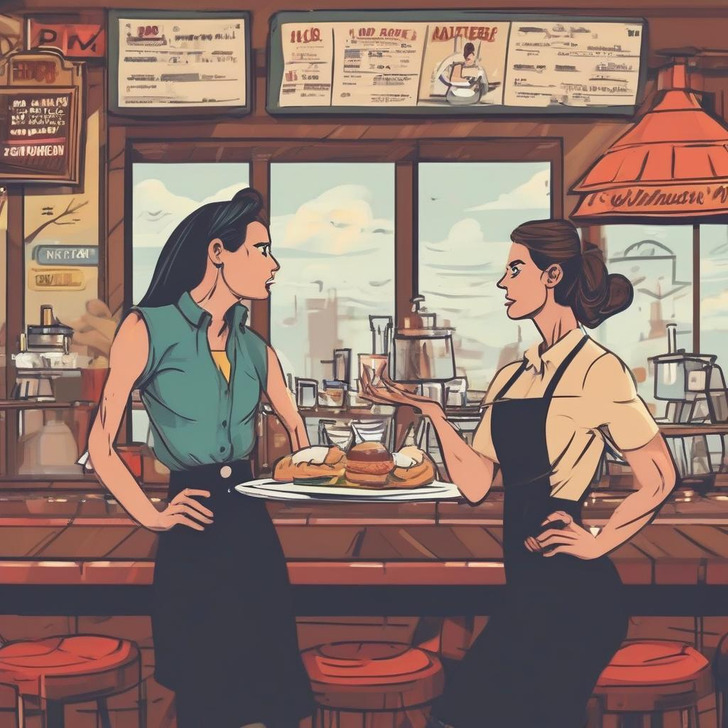
In retrospect, it might have been more productive to calmly address the issue with the manager or supervisor, rather than engaging in a public confrontation. By maintaining composure and seeking a resolution through proper channels, both parties could have avoided the escalation that ultimately tarnished the evening.
De-escalation techniques, such as taking a step back, speaking calmly, and seeking mediation, can often prevent minor disagreements from spiraling into more significant conflicts. Engaging in constructive problem-solving and conflict resolution can not only resolve the immediate issue but also strengthen communication and understanding between all parties involved.
Friction offers a chance for growth.
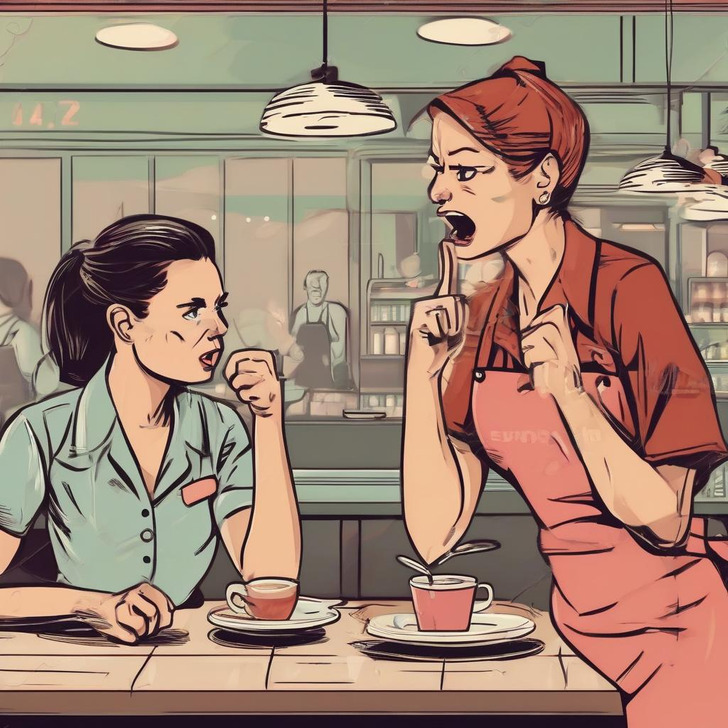
Amelia, while the situation was undoubtedly frustrating, it presents an opportunity for personal growth and reflection. Recognizing that we all have moments of imperfection can help foster a more compassionate and understanding society. Moving forward, remember that respect and empathy should be the guiding principles in all interactions, even in the face of adversity.
By embracing these values, we can create a more harmonious and positive environment for ourselves and those around us, and potentially avoid similar unpleasant situations in the future. Ultimately, a little understanding and kindness can go a long way in promoting positive interactions and fostering a more respectful and empathetic society.
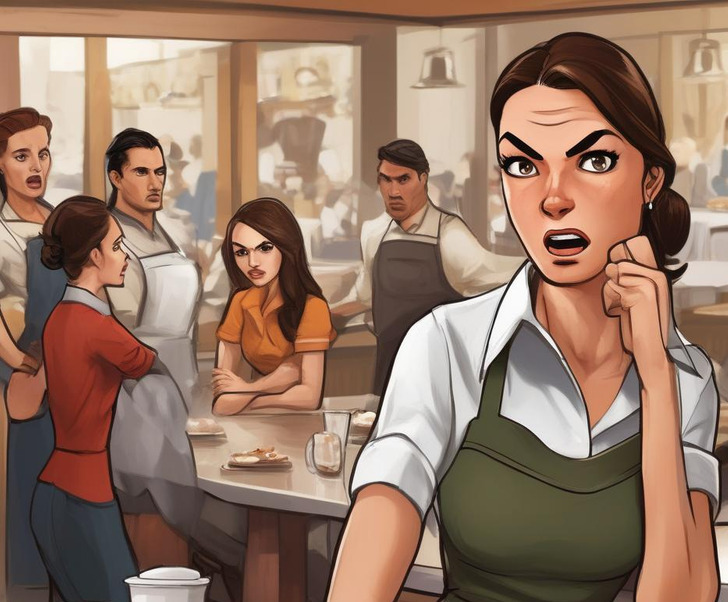
Navigating conflicts with grace, composure, and a willingness to see others' perspectives not only diffuses tense situations but also fosters greater understanding and harmony. Amelia's story reminds us that a little empathy can go a long way in creating a more respectful and compassionate world. For a related story, check out how people are reacting to servers' hourly pay and the opinion that "tipping culture is out of control."
Comments
Related Reads
12 Life Moments Where Quiet Kindness Played the Main Role

10 Hospital Workers Who Prove Kind Heart Is a Powerful Medicine

I Refuse to Give My Retirement Savings to My Adult Son—I’m Not Responsible for His Failures
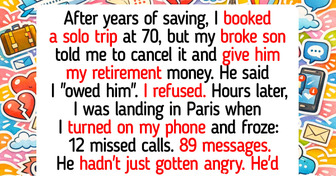
I Was Shamed by HR for Leaving at 5:50—So I Counted My Boss’s Watercooler Breaks
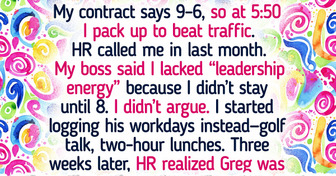
I Refuse to Support My SAHM Wife After Discovering Her Secret
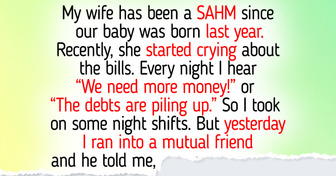
12 Times Kindness Proved to Be the Most Powerful Force of All
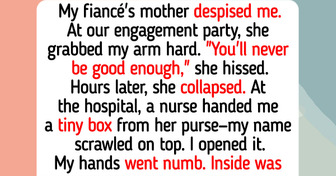
16 Real-Life Moments That Prove Kindness Is a Quiet Strength
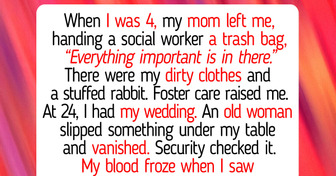
I Refused to Expose My Salary to My Parents, Now My Life Is Falling Apart
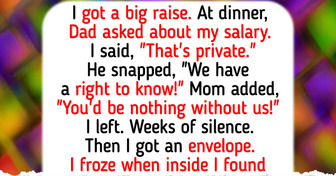
14 Real Moments When Empathy Changed Everything Forever
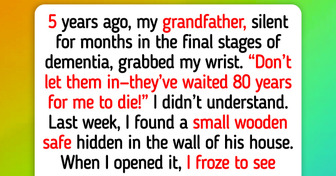
My Brother Has No Kids but Refuses to Share His Inheritance With Mine—I’m Furious
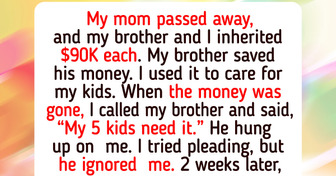
I Refuse to Let My Neighbors Ruin My Sleep—So I Got Even
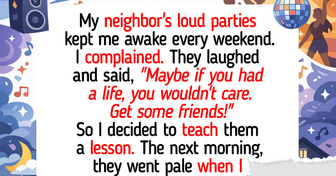
I Kicked My Parents Out of My Graduation—They Didn’t Contribute to My Education
